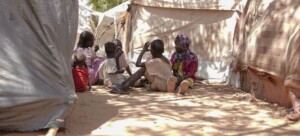Sudanese govt’s decision on gold mining meets with mixed reactions
The government’s decision to forbid the use of toxic cyanide and mercury in gold mining has been met with mixed reactions. Many see it as a positive first step. Some want to government to go further.
 A sit-in against toxic gold mining in Talodi, South Kordofan, last month (Social media)
A sit-in against toxic gold mining in Talodi, South Kordofan, last month (Social media)
The government’s decision to forbid the use of toxic cyanide and mercury in gold mining has been met with mixed reactions. Many see it as a positive first step. Some want the government to go further.
In a joint statement the Resistance Committees Coordination of Talodi, Kalogi and El Leri in South Kordofan stated that the government’s decision falls far below the aspirations and wishes of the residents of the affected areas.
The statement stressed that the gold mining companies operate without any clear legal framework and that the government shouldn’t file lawsuits against these companies, but should remove them from the region.
In their joint statement, the coordinators affirmed their full and unequivocal commitment to prosecuting the mining companies to achieve justice and to safeguard the dignity of the people in the region. They also want financial compensation from the gold mining companies.
There have been mass protests in South Kordofan against gold mining companies for months. Two weeks ago protestors burned offices of mining companies and attacked a base of the Rapid Support Forces militia, killing a militiaman.
On September 11, the governor of South Kordofan ordered the closure of all mining plants in the state, in reaction to pressure from environmental health activists and protesting residents worried about the hazards of the use of the highly toxic mercury and cyanide to extract gold from ore. The mining companies however refused to implement the governor’s order and the governor did not enforce it.
National Committee for Environmental Protection
The National Committee for Environmental Protection welcomed the government’s decision on mining operations “as the beginning of a victory for people’s concerns and their right to live in a healthy environment, free from diseases and pollution”.
Secretary-General Ahmed Mukhtar told Radio Dabanga that the decision received great support among the residents of the affected areas in South Kordofan. He stressed that the decision should be followed by practical measures and implementation on the ground.
He appealed to the people and various executive bodies to monitor the way the gold mining companies operate, in order to ensure the implementation of the government’s decision and to safeguard the people and the environment.
Northern State
The residents of Sawarda in the Northern State welcomed the government’s decision on mining operations in the country.
Spokesman Wael Hasan of the Six-Party Committee for Resistance to Mining Damage told Radio Dabanga that the government’s decision represents a very big step and boosted the morale of the youth in the affected areas in the Northern State.
He also stressed the committee needs assurances that vulnerable people benefiting from traditional mining have been taken into account and that the government will find alternatives for them.
Radio Dabanga’s editorial independence means that we can continue to provide factual updates about political developments to Sudanese and international actors, educate people about how to avoid outbreaks of infectious diseases, and provide a window to the world for those in all corners of Sudan. Support Radio Dabanga for as little as €2.50, the equivalent of a cup of coffee.












 and then
and then